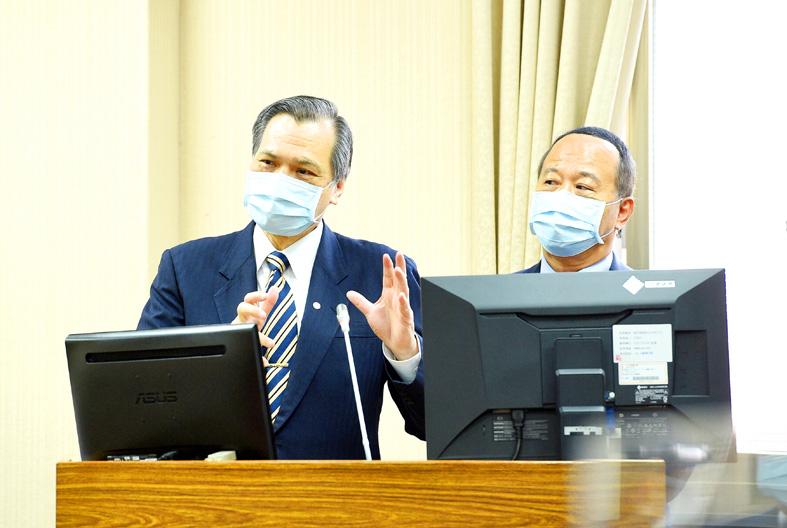It is “highly unlikely” that China would invade Taiwan this autumn, National Security Bureau (NSB) Director-General Chen Ming-tong (陳明通) told lawmakers yesterday, amid reports of a leaked Russian intelligence document suggesting that Chinese President Xi Jinping (習近平) is considering doing so.
“I believe this so-called leaked document is part of cognitive warfare targeting Taiwan,” Chen told a meeting of the legislature’s Foreign Affairs and National Defense Committee, but stopped short of naming China or Russia.
As the Chinese Communist Party (CCP) is scheduled to hold its 20th National Congress this autumn, the party’s main task is to maintain stability, Chen said.
It is therefore extremely unlikely that China would invade Taiwan at that time, he said.
Xi is widely expected to secure a third five-year term as the head of the CCP at the congress, and embark on a reshuffle that could see top party leaders replaced.
The alleged document was made public last week by Russian dissident Vladimir Osechkin.
According to the letter, which Osechkin said was from an intelligence officer in the Russian Federal Security Service, Xi was “considering taking over Taiwan in the fall ... as he needs his own little victory to get re-elected for a third term.”
However, “after the Ukrainian events, this window of opportunity has been closed” to Xi, which now gives the “United States the opportunity to both blackmail Xi and negotiate with its competitors on favorable terms,” the letter said.
The military said it has no comment when asked about the document.
Chen told lawmakers that the Russian invasion of Ukraine was a wake-up call for the democratic world to be more alert to the threats posed by authoritarian countries like Russia and China.
Unlike Europe and the US, which have an existing collective security system, East Asia does not have a similar mechanism and cannot mount a swift response if war breaks out in the Taiwan Strait, Chen said.
However, the US’ Taiwan Relations Act commits Washington to providing Taipei with the means to defend itself, which can serve as a legal basis for the US to assist Taiwan in case of a Chinese invasion, he said.
Chen added that he does not see China adopting a “reunification law,” as it would put too much pressure on Beijing to set a timetable for bringing Taiwan under its control, which could severely raise tensions.
China has not officially proposed such legislation, which would be a follow-up to its passage of the Anti-Secession Law in 2005 giving Beijing the legal basis for military action should Taiwan secede or consider seceding from China.
However, it has been discussed in state media. Asked about a political adviser’s suggestion that such a law be enacted, a spokesperson for China’s Taiwan Affairs Office last week said that it would “carefully listen to, and study opinions and suggestions.”
Adopting a reunification law would be “equivalent to setting a timetable,” Chen said. “In the past, during the Deng Xiaoping (鄧小平) era, they tried to set a timetable, but in the end thought it best not to, as it would put pressure on them.”
Additional reporting by Reuters
Source: Taipei Times - 2022/03/25





















